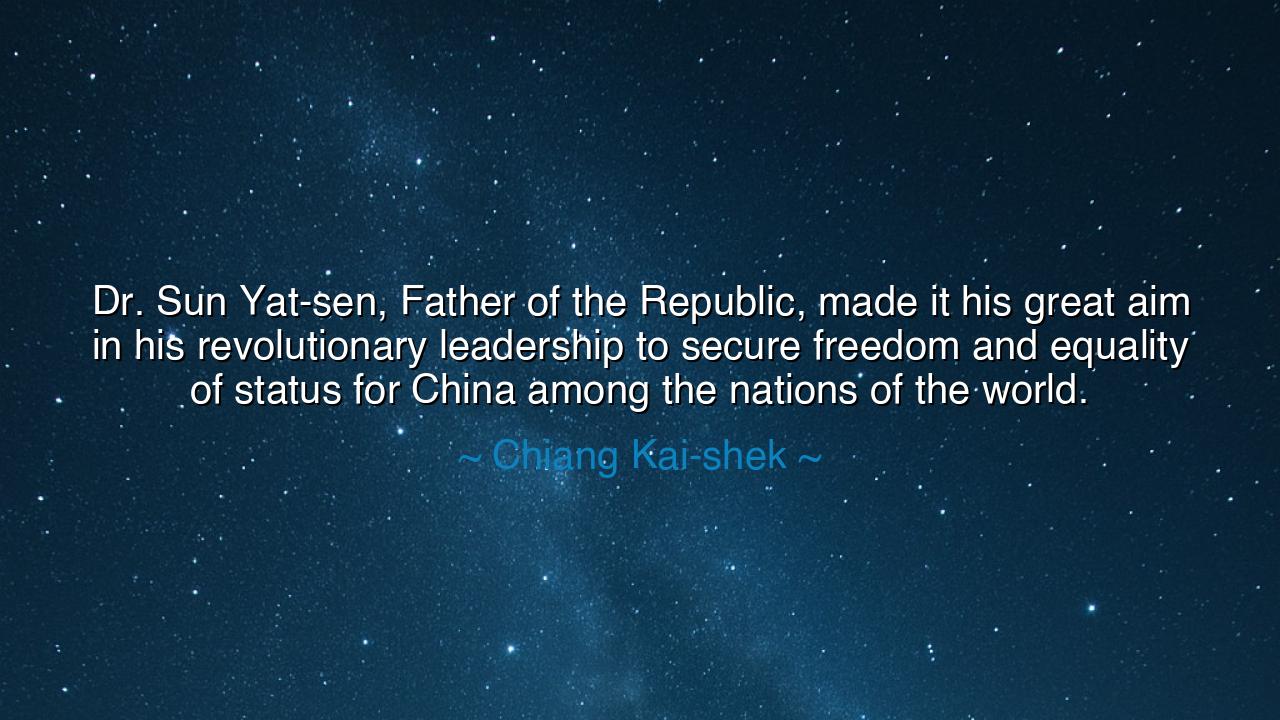
Dr. Sun Yat-sen, Father of the Republic, made it his great aim in
Dr. Sun Yat-sen, Father of the Republic, made it his great aim in his revolutionary leadership to secure freedom and equality of status for China among the nations of the world.






Chiang Kai-shek once declared: “Dr. Sun Yat-sen, Father of the Republic, made it his great aim in his revolutionary leadership to secure freedom and equality of status for China among the nations of the world.” These words are not a mere tribute to a man, but a torch passed from one generation to another, a reminder of the dream that gave birth to modern China. They speak of a vision not bound to one lifetime, but woven into the eternal struggle of a people yearning to rise, to be free, and to stand with dignity among the nations.
Dr. Sun Yat-sen, often called the Father of Modern China, was more than a revolutionary—he was a prophet of renewal. In the twilight of the Qing dynasty, when corruption had hollowed the throne and foreign powers carved the land as if it were spoils of war, Sun did not surrender to despair. He dared to believe in freedom, not as a luxury, but as the birthright of every Chinese soul. He dreamed of a republic where the farmer and scholar, merchant and soldier, stood as equals—not servants of emperors, but citizens of a new age.
His revolutionary leadership was not born of hatred alone, but of hope. He looked beyond the ruins of oppression to a China reborn, a China that could look into the eyes of the world without shame. He declared the Three Principles of the People—nationalism, democracy, and livelihood—as pillars upon which the house of the Republic would be built. These principles were not drawn from ambition for power, but from a deep compassion for the millions who had suffered under tyranny and humiliation.
Consider the Revolution of 1911. The Qing dynasty, weakened and disgraced, clung desperately to its throne. Yet in that year, the fire of Sun’s vision ignited across provinces. Men and women of every station rose in courage. Armies mutinied, scholars conspired, peasants rallied, and the dragon throne of centuries was overturned. It was not an easy victory—blood was spilled, and confusion reigned—but from that storm emerged the dawn of the Republic. The people, long silent under emperors, now spoke as citizens of a nation.
Chiang Kai-shek’s words remind us that Sun’s goal was not merely internal reform, but the restoration of China’s dignity among the world’s nations. For centuries, foreign powers had forced their will upon the land—wars, treaties, and occupations reduced China to the “Sick Man of Asia.” Sun Yat-sen, through his vision of freedom and equality, sought to cast off these chains. He longed for a China that would walk tall among nations, not as beggar nor slave, but as an equal partner in the destiny of mankind.
The lesson here is timeless: that freedom and equality of status do not come as gifts from rulers, but as the fruit of sacrifice, unity, and vision. Sun Yat-sen’s dream was carried forward not because it was easy, but because men and women were willing to labor, to bleed, and to hope. His life reminds us that true leadership is measured not by the power one seizes, but by the future one builds for the people.
And so, children of tomorrow, what must you do? Remember that every nation, every community, every family must guard the sacred flame of freedom. Do not accept humiliation where dignity can be restored. Do not shrink into silence when equality is denied. Lead, as Sun led—with compassion for the weak, courage against the oppressor, and faith that the struggles of today are the foundations of tomorrow’s liberty.
Let this be your inheritance: to honor the memory of those who fought before you, by living as they dreamed—strong, free, and equal among all peoples of the earth. For in every age, the world belongs not to emperors nor conquerors, but to those who, like Sun Yat-sen, dare to imagine freedom and fight to make it real.






AAdministratorAdministrator
Welcome, honored guests. Please leave a comment, we will respond soon